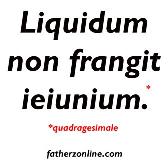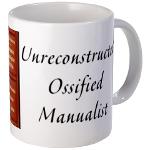 According to the 1983 Code of Canon Law for the Latin Church, Latin Church Catholics are bound to observe fasting and abstinence on Ash Wednesday.
According to the 1983 Code of Canon Law for the Latin Church, Latin Church Catholics are bound to observe fasting and abstinence on Ash Wednesday.
Here are some details. I am sure you know them already, but they are good to review.
FASTING: Catholics who are 18 year old and up, until their 59th birthday (when you begin your 60th year), are bound to fast (1 full meal and perhaps some food at a couple points during the day, call it 2 “snacks”, according to local custom or law – call it, two snacks that don’t add up to a full meal) on Ash Wednesday and on Good Friday.
There is no scientific formula for this. Figure it out.
ABSTINENCE: Catholics who are 14 years old and older are abound to abstain from meat on Ash Wednesday and on all Fridays of Lent.
In general, when you have a medical condition of some kind, or you are pregnant, etc., these requirements can be relaxed.
For Eastern Catholics there are differences concerning dates and practices. Perhaps our Eastern friends can fill us Latins in.
You should by now have a plan for your spiritual life and your physical/material mortifications and penitential practices during Lent.
You would do well to include some works of mercy, both spiritual and corporal.
I also recommend making a good confession close to the beginning of Lent. Let me put that another way:
GO TO CONFESSION!
“But Father! But Father!”, some of you are saying anxiously, “What about my Mystic Monk Coffee? I can drink my Mystic Monk Coffee, can’t I? Can’t I?”
You can, of course, coffee with and as part of your full meal and two “snacks”. No question there.
 How about in between meals on Ash Wednesday?
How about in between meals on Ash Wednesday?
The old axiom, for the Lenten fast, is “Liquidum non frangit ieiunium … liquid does not break the fast”, provided – NB – you are drinking for the sake of thirst, rather than for eating.
Common sense suggests that chocolate banana shakes or “smoothies”, etc., are not permissible, even though they are pretty much liquid in form. They are not what you would drink because you are thirsty, as you might more commonly do with water, coffee, tea, wine in some cases, lemonade, even some of these sports drinks such as “Gatorade”, etc.
Again, common sense applies, so figure it out.
 Drinks such as coffee and tea do not break the Lenten fast even if they have a little milk added, or a bit of sugar, or fruit juice, which in the case of tea might be lemon.
Drinks such as coffee and tea do not break the Lenten fast even if they have a little milk added, or a bit of sugar, or fruit juice, which in the case of tea might be lemon.
Coffee would break the Eucharistic fast (one hour before Communion), since – pace fallentes – coffee is no longer water, but it does not break the Lenten fast on Ash Wednesday.
You will be happy to know that chewing tobacco does not break the fast (unless you eat the quid, I guess), nor does using mouthwash (gargarisatio in one manual I checked) or brushing your teeth (pulverisatio).
Concerning the consumption of alligator and crocodile – HERE I included notes also on the eating of endothermic moonfish, peptonized beef, and muskrat… just in case.
If you want to drink your coffee and tea with true merit I suggest drinking it from one of my coffee mugs. I’d like to offer an indulgence for doing so, but that’s above my pay grade.
I just happen to have available a “Liquidum non frangit ieiunium” mug! HERE



































A blessed Fast all! You asked for help on the regulations for Eastern Catholics. There are a few differences but the focus is the same. First, we began the Great Fast on Monday. Why do we begin on Monday? To quote Tevye from Fiddler on the Roof, “it’s a tradition”. Also (traditionally) the Fast is completely vegan with fish and oil allowed on weekends and major feasts (this is the practice in Eastern monasteries and therefore the ideal). Lay people are bound to follow the yearly guidelines released by their Eparch which is generally less strict. The general guideline is abstinence from meat (including fish … anything with a backbone is considered meat), eggs, and dairy on Mon., Wed., Fri. during the Fast. Clean Monday (1st day of the Fast) and Great and Holy Friday are strict abstinence days, so again no meat, dairy, or eggs and generally no food is taken from midnight on the following day till after Vespers. Of course, the young, the old, the sick, and nursing mothers are exempted from the fasting regulations. It is also highly recommended that a fasting rule beyond what is given in the guidelines from the Bishop be approved by your spiritual Father before implementing it.
Additionally, during the Great Fast, we are encouraged to attend the Liturgy of the Presanctified Gifts (offered generally on Mon., Wed., & Fri.). It’s a beautiful service (think Good Friday Communion service in the West) that was traditionally compiled by St. Pope Gregory the Great. The Royal Hours and other services (especially the Burial Vespers on Great and Holy Friday) are especially beautiful.
I hope this helps and please pray for me, a sinner!
Opah is actually pretty decent, widely available in Hawaii, and is becoming somewhat popular at sushi restaurants overseas, so it’s not outside the realm of possibility that it gets presented to someone on a day of abstinence.
I would think since that while it would perhaps in a strict sense violate the letter of the law, the spirit was clearly not to forbid something that was always thought allowed as soon as some biologist figured out its metabolic rate and thick skin could keep its internal temperature a few degrees warmer than the surrounding ocean.
What are your thoughts on opah, Father? Tasty?
As long as you are not pregnant or a nursing mother or a child or underweight or suffer from some other precluding condition, you cannot go wrong by just not eating at all on a fast day! It is actually beneficial to your health to abstain completely from food from time to time, provided you stay hydrated.
I have seen the distinction between drinking for hydration vs. drinking for nourishment. I get that. But when I drink tea or coffee, I mostly drink it to stay awake and alert. (I drink both beverages neat — no milk or sugar.) I’m going to assume that since I’m consuming caffeine as a drug, not as food, that it’s okay.